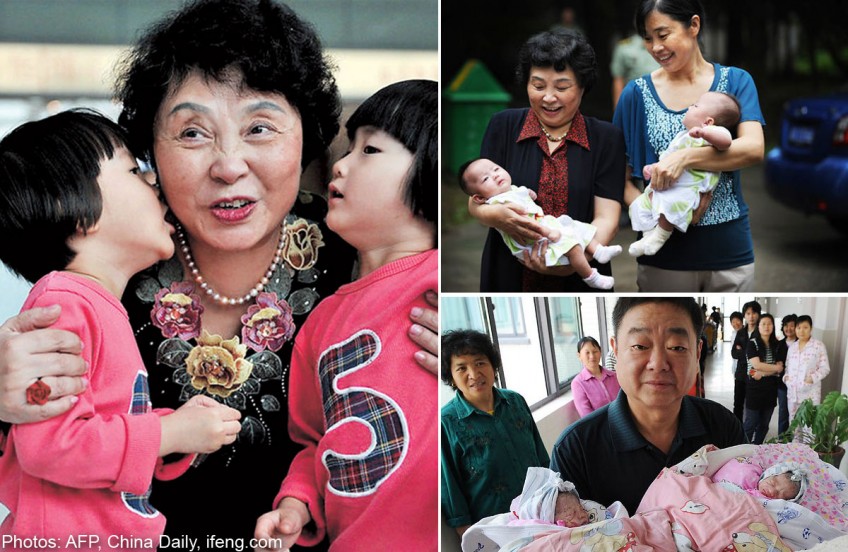A return to motherhood at 60

BEIJING - A Chinese woman had twin girls at the age of 60 following IVF treatment after her only child died, making her possibly the oldest person in the country to give birth, state media reported.
The case is extremely unusual in China, which has long maintained a one-child policy, because of the woman's age.
Worldwide, many countries and clinics impose limits on IVF treatment which is known to become less effective with age, and amid concerns for the resulting children's welfare.
Sheng Hailin, now 63, lost her first daughter, then in her late 20s, in an accidental gas poisoning case in 2009, the China Daily said.
The loss sent Sheng into deep mourning. But on advice from family and friends, she decided to try again. She was 60 years old.
"To survive and free myself of the loneliness, I decided to have another child in my old age," she was quoted by the newspaper as saying.
A military hospital in the eastern city of Hefei agreed to give her and her husband in vitro fertilization (IVF) therapy after consulting several fertility experts, the report said. China Daily did not explain why Sheng was accepted for treatment.
After three months of medication and injections, Sheng resumed ovulation and her monthly menstrual cycle - prerequisites to implantation. Three fertilised eggs were then moved into her body.
During the pregnancy, she endured hemorrhages, body pains and other discomforts. She gave birth to Zhizhi, who weighed 1.85 kilograms (4.1 pounds), and Huihui, 1.45 kilograms, on May 25, 2010 at the No. 105 Hospital of the People's Liberation Army, said the paper.
A return to motherhood at 60
To support the two new members of the family, the now 63-year-old Sheng had to restart her work and travel across China giving lectures, leaving her young daughters with two baby sitters.
"For the baby girls, I have given out all I have," Sheng said, adding that expenses surpass 10,000 yuan (US$1,600) a month.
"I hope the two children can live in comfort before their adulthood and receive regular education like other children." Sheng said. She has not forgotten her first child and tells her toddlers stories about their sister.
"I am trying to tell them why I brought them to the world - to let them know the truth from childhood. They will understand me when they grow up."
The oldest woman to give birth anywhere, according to the Guinness Book of Records, was Maria del Carmen Bousada Lara, of Spain, who had twin boys by Caesarean in 2006 aged 66 years 358 days.
She died of cancer three years later.
China has implemented its family planning law for over 30 years, sometimes brutally, restricting most parents to only one child, with exceptions including some rural families whose first child is a girl, ethnic minorities, and couples who are both only children.
An estimated one million families nationwide have lost their sole descendant since the measure took effect in the late 1970s, and another four to seven million are expected to do so in the next 20 to 30 years.
Such families face uncertain futures, with no one to help them through the frailties or medical costs of old age, and an unshakeable sense of loss in a culture that emphasizes family.
The report came as China's top legislative committee is set to formalize a wider exception to the one-child limit, to allow couples where only one is an only child to have two offspring.
A return to motherhood at 60
A hospital that helped a 60-year-old woman become a mother again said it has seen a steady stream of women who want to become pregnant after the death of their only child.
In May 2010, the No 105 Hospital of the People's Liberation Army in Hefei, Anhui province, helped Sheng Hailin give birth to twin daughters after in vitro fertilization, also known as test-tube baby technology.
Sheng is not alone. An estimate based on figures provided by the National Health and Family Planning Commission suggests that each year, about 76,000 families across the country lose an only child.
Demographer Yi Fuxian said that in the foreseeable future, there may be as many as 10 million Chinese families in that category.
A chief physician at one hospital's fertility clinic who asked not to be identified said: "In recent years, we have seen a steady rise in the number of parents who have lost an only child coming to consultation about having another baby."
The doctor added that the public is not widely aware of current advancements in reproductive technology; otherwise, even more people would be seeking assistance.
The women seeking the consultations have moved past their prime childbearing years and may be 35 or older.
Ma Chenguang in Hefei contributed to this story.
wangzhenghua@chinadaily.com.cn